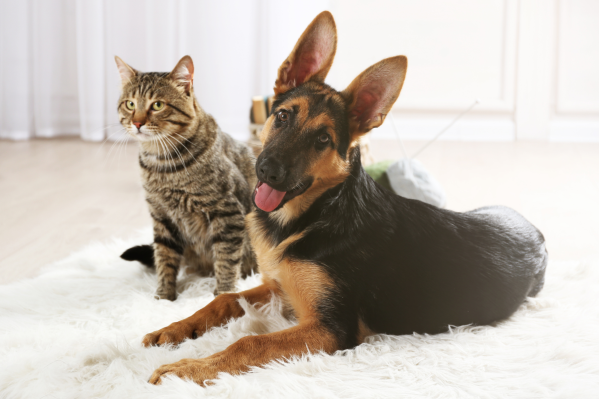As pet parents, as much as we try to avoid it, sometimes our pets get their paws on things they shouldn't—and in some cases, those things can be poisonous.
Each year, the ASPCA Animal Poison Control Center compiles a list of the top ten pet toxins from the previous year. Although the 2022 report has not yet been released, the 2021 report reveals how dangerous common household items and pantry staples can be to your furry friend.
Top ten pet toxins of 2021
Over-the-counter medications—ibuprofen, vitamin D, and herbal supplements
Prescription medication for humans—cardiac medications, antidepressants, and ADHD medication
Food—xylitol, protein bars and shakes, onions, garlic, grapes, and raisins
Plants
Household toxins—paint, beauty, and cleaning products
Veterinary products—joint and calming chews
Rodenticides
Insecticides
Garden products
While this list includes the most common toxins from the previous year, this is by no means an exhaustive list of the potential poisons that can affect your pet. The below list includes both edible and non-edible toxins that pet parents should be aware of.
Keep in mind that some of these toxins are more dangerous than others, and factors such as the amount ingested, your pet’s weight, and any underlying health conditions they have can also influence outcomes after ingestion. Some of the toxins also affect cats and dogs differently, so if you think your pet ingested any of the following, it's important to talk to a vet.
What is toxic to cats and dogs?
Edible toxins for pets
Chocolate
Alcohol
Caffeine
Grapes and raisins
Avocados
Garlic
Onions
Xylitol (often in gum)
Medication for humans or another pet
Macadamia Nuts
Walnuts
Hops (used in home beer brewing)
Chives
Cherry pits
Apple seeds
Mustard Seeds
Tobacco products
Yeast products
Non-edible toxins for pets
Antifreeze
Ice melting products
Insecticides and pesticides
Lawn fertilizers and weed killers
Fabric softener sheets
Cocoa mulch
Blue-green algae
Mothballs
Liquid potpourri
Rodent bait
Paint and solvents
Household cleaners
Swimming pool chemicals
Play dough and salt dough
Flowers and plants that are toxic to pets
Almond Tree
Aloe Vera
Amaryllis
Apricot Tree
Caster Bean
Cherry Tree
Chrysanthemum
Cyclamen
Corn Plant
Daffodil
Daphne
Dogbane
English Ivy
Foxglove
Golden Pothos
Hibiscus
Hyacinth and Tulip (especially the bulbs)
Hydrangea
Jonquil
Kalanchoe
Lilies
Mother-in-Law Tongue
Mountain Laurel
Mushroom plants
Narcissus
Nectarine Tree
Paperwhite
Oleander
Peach Tree
Philodendron
Plum Tree
Poinsettia
Rhododendron and Azalea
Rosary Pea
Sago Palm
Schefflera
Stinging Nettle
Yesterday, Today and Tomorrow Plant
Yew Bush
It's important for pet parents to know what to do if their pet ate something toxic. Signs of toxic ingestion include diarrhea, vomiting, lethargy, hyperactivity, collapse, seizures, drooling, and more.
If you think your pet has ingested any of the above toxins, contact a veterinarian and call the ASPCA Animal Poison Control Center at 888-426-4435.
Resources:
